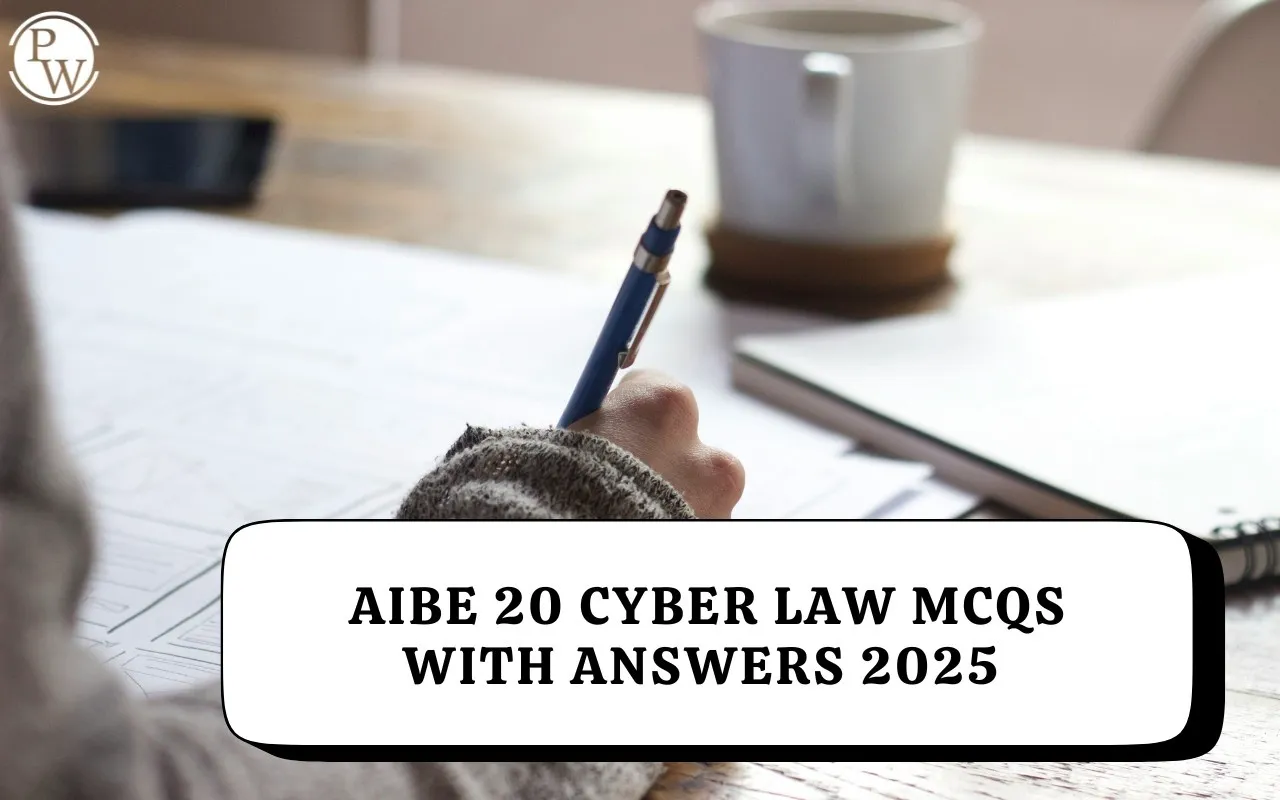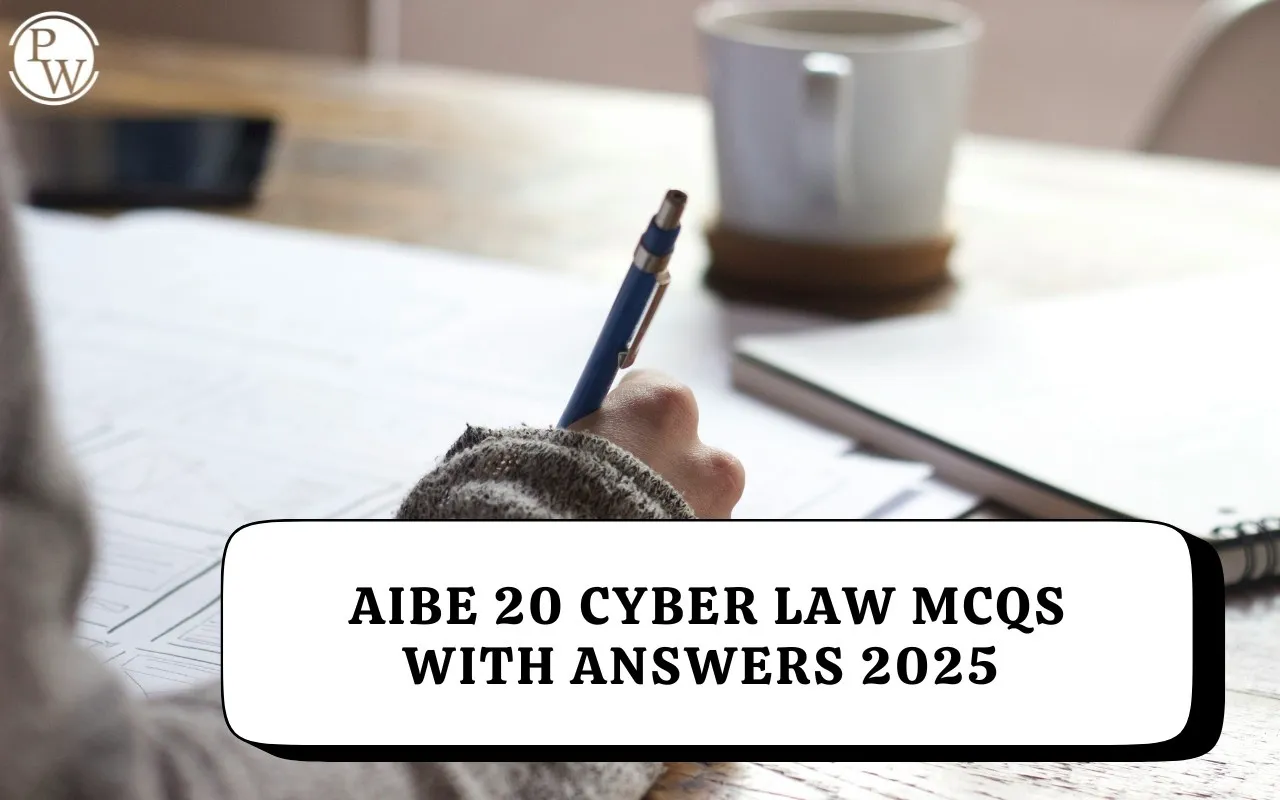

AIBE 20 Cyber Law MCQs with Answers 2025: The important questions pertaining to Cyber Law in AIBE 20 come precisely on the Information Technology Act, 2000, as amended. This develops better insights among law students on cyber laws, computer crimes, and e-governance. It tests the knowledge of the candidates on basic definitions, sections, and punishment under the IT Act.
Below are 20 top Cyber Law MCQs from AIBE 20 with answers, the marking scheme, key cyber law cases, and preparation tips to help candidates score well in the AIBE 20 exam 2025.
Top 20 AIBE 20 Cyber Law MCQs with Answers 2025
These top 20 Cyber Law multiple-choice questions are based on the Information Technology Act, 2000, and its amendments. Practicing these questions will help candidates prepare effectively and boost their confidence for the exam.
-
The IT Act, 2000 came into force on which date?
a) 1 January 2001
b) 27 October 2000
c) 17 October 2000
d) 9 June 2000
Answer: c) 17 October 2000 -
According to Section 2(1)(t) of the IT Act, 2000, what does "electronic record" mean?
a) Only data and records generated in an electronic form.
b) Data, record, or data generated, image, or sound stored, received, or sent in an electronic form or microfilm or computer-generated microfiche.
c) Information stored exclusively on computer disks.
d) Any physical document scanned and saved as a digital image.
Answer: b) Data, record, or data generated, image, or sound stored, received, or sent in an electronic form or microfilm or computer-generated microfiche. -
As defined in Section 2(1)(a) of the IT Act, 2000, the term "access" relates to gaining entry into, instructing, or communicating with which of the following?
a) Individual's personal records only.
b) Logical, arithmetical, or memory function resources of a computer, system, or network.
c) Publicly available information stored online.
d) Hardware resources of a computer, but not the software.
Answer: b) Logical, arithmetical, or memory function resources of a computer, system, or network. -
Which section defines 'Certifying Authority'?
a) Section 2 (1) (d)
b) Section 2 (1) (g)
c) Section 2 (1) (t)
d) Section 2 (1) (q)
Answer: b) Section 2 (1) (g) -
Which chapter of the IT Act relates to Electronic Governance?
a) Chapter III
b) Chapter V
c) Chapter VIII
d) Chapter X
Answer: a) Chapter III -
As per Section 6 of IT Act, when is filing deemed satisfied?
a) Any email submission is accepted.
b) Electronic filing is done in prescribed manner by appropriate Government.
c) Physical filing first.
d) Done only through private vendors.
Answer: b) Electronic filing is done in prescribed manner by appropriate Government. -
Under IT Act, cyber terrorism is dealt with in which section?
a) Section 66A
b) Section 66D
c) Section 66F
d) Section 67
Answer: c) Section 66F -
Legal recognition of electronic signatures is under which section?
a) Section 3
b) Section 4
c) Section 5
d) Section 6
Answer: c) Section 5 -
Which section punishes publishing obscene material electronically?
a) Section 65
b) Section 66
c) Section 67
d) Section 43
Answer: c) Section 67 -
The IT (Amendment) Act was passed in which year?
a) 2007
b) 2008
c) 2009
d) 2010
Answer: b) 2008 -
"Tampering with computer source documents" is offence under which section?
a) Section 65
b) Section 66
c) Section 67
d) Section 43
Answer: a) Section 65 -
What does "intermediary" mean under Section 2(1)(w)?
a) Govt official monitoring internet traffic.
b) Mediator in cyber disputes.
c) Person who receives, stores or transmits electronic records on behalf of others.
d) None of above.
Answer: c) Person who receives, stores or transmits electronic records on behalf of others. -
Punishment for cheating by impersonation using computers (Section 66D)?
a) Three years imprisonment and fine up to ₹1 lakh.
b) Two years imprisonment and/or fine.
c) Life imprisonment.
d) Five years imprisonment.
Answer: a) Three years imprisonment and fine up to ₹1 lakh -
Who issues a digital signature certificate?
a) Subscriber
b) Certifying Authority
c) Adjudicating Officer
d) Cyber Appellate Tribunal
Answer: b) Certifying Authority -
The appellate body for Cyber Appellate Tribunal decisions?
a) Supreme Court
b) High Court
c) District Court
d) Munsiff Court
Answer: b) High Court -
Who appoints Controller of Certifying Authorities (CCA)?
a) President of India
b) Prime Minister’s Office
c) Ministry of Communications and IT
d) Central Government
Answer: d) Central Government -
Section protecting intermediaries from liability?
a) Section 66
b) Section 79
c) Section 43A
d) Section 66C
Answer: b) Section 79 -
Which section holds corporations accountable for neglect in personal data protection?
a) Section 66A
b) Section 72
c) Section 43A
d) Section 69
Answer: c) Section 43A -
Punishment for identity theft under Section 66C?
a) Imprisonment up to 1 year and fine up to ₹50,000
b) Imprisonment up to 5 years or fine up to ₹1 lakh or both
c) Imprisonment up to 2 years or fine up to ₹1 lakh or both
d) Imprisonment up to 3 years and fine up to ₹1 lakh
Answer: d) Imprisonment up to 3 years and fine up to ₹1 lakh -
Who appoints the Adjudicating Officer under Section 46?
a) President of India
b) High Court
c) Central Government
d) Controller of Certifying Authorities
Answer: c) Central Government
AIBE 20 Cyber Law MCQs with Answers 2025 PDF
Candidates can download the AIBE 20 Cyber Law MCQs with Answers 2025 PDF for offline practice. This PDF consists of questions and answers pertaining to the IT Act, including questions on definitions such as "electronic record," "cyber terrorism," and sections dealing with electronic signatures and certifying authorities, and punishment for cyber offenses.
Practicing with this PDF develops accuracy and speed in exams, as it makes students aware of the pattern of questions..
AIBE 20 Marking Scheme 2025
Below summarizes the marking scheme for the AIBE 20 Cyber Law exam in 2025. It highlights the scoring system, including marks per question and the absence of negative marking, helping candidates understand how their performance is evaluated.
|
AIBE 20 Marking Scheme 2025 |
|
|
Marking Aspect |
Details |
|
Marks per Correct Answer |
1 mark |
|
Negative Marking |
None |
|
Marks for Unattempted Questions |
0 |
|
Importance |
Helps improve overall score without penalty risk |
Important Cases on Cyber Law for AIBE 20
Here is list of important cyber law cases for AIBE 20 preparation, including two additional landmark cases:
-
Shreya Singhal v. Union of India (2015): Landmark case striking down Section 66A of the IT Act, protecting free speech online.
-
Google India Pvt. Ltd. v. Visaka Industries Ltd.: Clarified search engines' liability under Information Technology laws.
-
Anvar P.V. v. P.K. Basheer: Established guidelines for admissibility of electronic evidence under Indian Evidence Act.
-
Avnish Bajaj v. State (Bazee.com case): First major case outlining intermediary liability in cyber law.
-
Syed Asifuddin v. State of Andhra Pradesh: Case addressing issues of software piracy and hacking.
-
Ajay Kumar Agarwal v. Union of India: Validated the legal enforceability of digital signatures.
-
State of Tamil Nadu v. Suhas Katti: A crucial case on online defamation and cyber harassment.
-
People’s Union for Civil Liberties v. Union of India: Landmark case focusing on privacy and data protection under cyber laws.
Benefits of AIBE 20 Cyber Law MCQs with Answers 2025
Practicing AIBE 20 Cyber Law MCQs with answers has a number of advantages for candidates. It helps build strong familiarity with key concepts and terminology in cyber law, and it sharpens problem-solving speed during exams.
-
Improves understanding of important provisions and definitions under cyber law.
-
Improved accuracy and confidence in answering questions of exams.
-
Lays a solid foundation for legal principles concerning computerized crimes.
-
Helps retain knowledge of landmark cases and IT Act sections
-
Improves speed and efficiency when dealing with multiple-choice questions.
-
Supports the practical application of Cyber Law in real-life situations
Start Your Preparation with AIBE 20 Cyber Law MCQs with Answers 2025
Here are some useful tips to start your preparation with AIBE 20 Cyber Law MCQs with Answers 2025:
-
Concentrate on learning important sections from the IT Act, 2000, particularly Sections 43, 66, 67, 79, and 85.
-
Practice regularly with sample papers and AIBE previous year question papers to improve speed and accuracy.
-
Pay close attention to important definitions, landmark cases, and punishments under cyber law.
-
Employ effective time management while taking the exam, answering those questions first that you find rather easier and will help to enhance your level of confidence.
-
Revise related laws: for example, the Indian Evidence Act and Constitutional Law, since many aspects of cyber law are related to these subjects.
-
Underline or highlight key provisions in Bare Acts for quick revision.
-
Do a last-minute review of the key points and sections using sticky notes or flashcards.
-
Attempt all questions as there is no negative marking in AIBE Cyber Law MCQs.
Explore the Judiciary Coaching 2025 to access essential resources for Judiciary exam preparation, including detailed insights and strategies. Dive into the Judiciary 2025 for structured courses and focused study plans designed to help aspirants excel in their exams.
